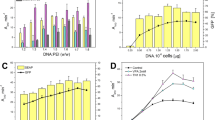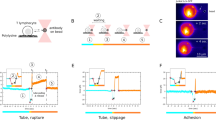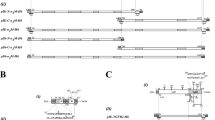Abstract
LYMPHOCYTE activation by lectins is initiated by the binding of the lectin to a cell surface receptor. It is not known, however, how this event occurring on the cell membrane is converted into a signal that is transmitted to the cell interior. Edelman and coworkers1–4 have advanced the hypothesis that lectin receptor sites may be attached to a submembranous microtubular system in a reversible way. This attachment could then determine the receptor mobility in the plane of the membrane and could also constitute a system for transmembrane signal transmission. The hypothesis is based, to a large extent, on the releasing effect that microtubule-disrupting drugs have on the inhibition of surface immunoglobulin cap formation in mouse B lymphocytes by concanavalin A (con A)2,3. Furthermore, evidence has been presented that colchicine delayed and suppressed the appearance of con A-induced blast cells in human lymphocyte cultures, that there is a delay in the onset of DNA synthesis in cultures containing colchicine and that drug sensitivity decreases with increasing culture time in the presence of con A4. Cap formation of surface immunoglobulin (Ig) is a phenomenon restricted to Ig-bearing B lymphocytes and these cells are not activated by con A. It is felt therefore that observations on this population do not bear directly on the relationship between the con A receptors and microtubuli as a signal-transducing mechanism. The other observations are suggestive but not conclusive for such a role of the microtubular system.
This is a preview of subscription content, access via your institution
Access options
Subscribe to this journal
Receive 51 print issues and online access
$199.00 per year
only $3.90 per issue
Buy this article
- Purchase on Springer Link
- Instant access to full article PDF
Prices may be subject to local taxes which are calculated during checkout
Similar content being viewed by others
References
Cunningham, B. A., Wang, J. L., Gunther, G. R., Reeke, G. N., and Becker, J. W., in Cellular Selection and Regulation in the Immune Response (edit. by Edelman G. M.), 177–197 (Raven, New York, 1974).
Edelman, G. M., Yahara, I., and Wang, J. L., Proc. natn. Acad. Sci. U.S.A., 70, 1442–1446 (1973).
Yahara, I., and Edelman, G. M., Expl Cell Res., 91, 125–142 (1975).
Wang, J. L., Gunther, G. R., and Edelman, G. M., J. Cell. Biol., 66, 128–144 (1975).
Kay, J. E., Levanthal, B. G., and Cooper, H. L., Expl Cell Res., 54 94–100 (1969).
Pogo, B. G. T., Cell Immun., 14, 134–138 (1974).
Wilson, L., Ann. N.Y. Acad. Sci., 253, 213–230 (1975).
Stewart, C. C., and Ingram, M., Blood, 29, 628–639 (1967).
Author information
Authors and Affiliations
Rights and permissions
About this article
Cite this article
BETEL, I., MARTIJNSE, J. Drugs that disrupt microtubuli do not inhibit lymphocyte activation. Nature 261, 318–319 (1976). https://doi.org/10.1038/261318a0
Received:
Accepted:
Published:
Issue Date:
DOI: https://doi.org/10.1038/261318a0
This article is cited by
Comments
By submitting a comment you agree to abide by our Terms and Community Guidelines. If you find something abusive or that does not comply with our terms or guidelines please flag it as inappropriate.



